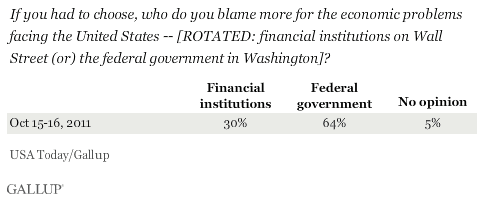 A number of people think that the protests on Wall St. do not belong there. The real problem is in Washington, they say, where financial CEO pay could be regulated and jobs for a multitude of people could be created.
A number of people think that the protests on Wall St. do not belong there. The real problem is in Washington, they say, where financial CEO pay could be regulated and jobs for a multitude of people could be created.
A new Gallup poll shows there is some wisdom to this school of thought. The data points out that “Americans are more than twice as likely to blame the federal government in Washington (64%) for the economic problems facing the United States as they are the financial institutions on Wall Street (30%).” Of course, the protesters do not read the polls and they may not be in touch with the opinions of most other citizens.
One of the reasons that the Occupy Wall Street movement may be stillborn and its numbers are so small is that the opinions of financial services executives and the CEOs of America’s large companies will do nothing to help the people who are the 99% of U.S. citizens who consider themselves distant from the elite and powerful.
General Electric (NYSE: GE) CEO Jeff Immelt said this week that he understands the frustration of the protesters who have camped out in southern Manhattan. He told Reuters, “Unemployment is 9.1 percent. Underemployment is much higher than that, particularly among young people that don’t have a college degree. It is natural to assume that people are angry, and I think we have to be empathetic and understand that people are not feeling great.” Immelt did not add that he would take a cut to his multimillion compensation package or that GE would begin to hire thousands of new workers.
Immelt and his peers are of no use to protestors, and based on the cost-cutting practices of the companies they run, they certainly will not be anytime soon. The ability to stimulate the economy and address unemployment is still in Washington, where the White House and Republican members of Congress continue to wrangle over a jobs bill and where the “super committee” appears to have made no progress on new deficit reduction packages.
Methodology: “Results for this USA Today/Gallup poll are based on telephone interviews conducted Oct. 15 – 16, 2011, on the Gallup Daily tracking survey, with a random sample of 1,026 adults, aged 18 and older, living in all 50 U.S. states and the District of Columbia.”
Douglas A. McIntyre
It’s Your Money, Your Future—Own It (sponsor)
Are you ahead, or behind on retirement? For families with more than $500,000 saved for retirement, finding a financial advisor who puts your interest first can be the difference, and today it’s easier than ever. SmartAsset’s free tool matches you with up to three fiduciary financial advisors who serve your area in minutes. Each advisor has been carefully vetted and must act in your best interests. Start your search now.
If you’ve saved and built a substantial nest egg for you and your family, don’t delay; get started right here and help your retirement dreams become a retirement reality.
Thank you for reading! Have some feedback for us?
Contact the 24/7 Wall St. editorial team.





